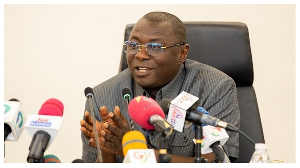Several Ghanaians who invested their money in bonds and other investments experienced losses due to the government's debt restructuring program.
This caused significant financial strain for many, as well as concerns about the decreasing value of their money over time.
The debt exchange program impacted various financial entities, including securities dealers, private banks, investment companies, insurance schemes, pension funds, and non-resident investors.
While bondholders will eventually receive their investments back, the delay means that the value of the money they receive will be reduced by inflation.
Speaking about this situation, finance minister Dr. Mohammed Amin Adam expressed confidence that those who lost money would recover within a year or two.
He said, “We have implemented measures that are driving the economy back, and with the rate of recovery that we are seeing, I do not have any doubt that in a year or two, those who have lost money will recover their money."
"Let's continue to build confidence in this economy as we have been doing. Let's continue to support this economy so we can build an economy that is good for all the people of Ghana," the Minister of Finance added.
The Domestic Debt Exchange Program (DDEP) aimed to adjust the interest rates and repayment terms for the bonds issued by the government to lenders.
In essence, the government replaced the original bond agreements with new ones, featuring different interest rates and repayment schedules.
The government stated that this domestic debt exchange program was part of a larger effort to improve the country's debt and financial stability.
Under the proposed terms of the exchange program, bondholders would receive a 10% annual interest rate, with a phased schedule starting at 0% in 2023, increasing to 5% in 2024, and reaching 10% from 2025 until maturity.
SA/MA
Watch the video below:
Click to view details



Business News of Wednesday, 4 December 2024
Source: www.ghanaweb.com

















